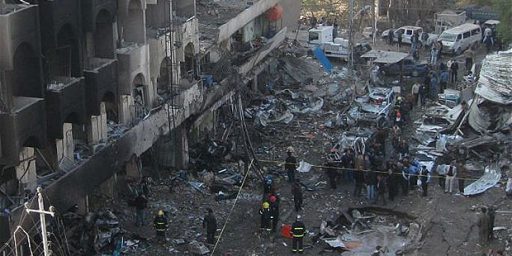The Anbar Handover
Yesterday formal responsibility for security in Iraq’s western Anbar province was turned over to Iraqi forces:
Baghdad – The US military handed over control of Anbar Province Monday, marking a significant milestone in the Iraq war.
Anbar was the deadliest Iraqi province for US troops, with nearly 1 in every 3 Americans killed there. It was once the symbol of Sunni resistance, the base of operations for Al Qaeda, and home to two major US military offensives and the most intense urban combat of the war.
But in the past two years, Anbar has emerged as the symbol of a turnaround as Sunni sheikhs formed “Awakening Councils,” ousted Al Qaeda, and created community police forces.
As of this writing 11 of Iraq’s 18 provinces have been returned to Iraqi control. Formidable challenges lie ahead: the remaining seven provinces have Iraq’s greatest sectarian and ethnic diversity and include some of Iraq’s most populous.
Additionally, although the forces now responsible for the security of Anbar Province are nominally under the control of the national government, practically many are militias under the control of local sheikhs who in many cases haven’t been brought into the political process in Iraq and, indeed, may not recognize the legitimacy of the elected Sunni leadership.
The handover may set the stage for freeing up the Marines, until now responsible for security in the province, for redeployment to Afghanistan:
Gen. James T. Conway told Pentagon reporters the marked drop in violence in Anbar sets the stage for a drawdown of Marine forces that could be freed up for duty in Afghanistan, if needed.
“The change in the al-Anbar province is real and perceptible,” with attacks at an all-time daily low of two to three, Conway said. He cited assessments by Marine Maj. Gen. John Kelly, commander of Multinational Force West, that a reduced U.S. force in the region could keep violence in check.
“Anbar remains a dangerous place, but the ever-growing ability of the Iraqi security forces continues to move us closer to seeing Iraqi control of the province,” he said.
A significant milestone.






But we hardly notcied anything of this in the press, and certainly not from the left-sider blogs. I’m willing to bet your post was the first many had heard about this one. Apparently, there’s no more political profit in proclaiming loudly that the war in Iraq is lost. Doesn’t help their case, I suppose, when Anbar, a province whereone US soldier was dying on average, daily, is treurned, nominially to the control of the newly formed Iraqi government.
OTOH, there’s more political profit, one supposes, in spinning events surrounding Sarah Palin.
Thus the relative coverage of each.
It’s not just a case of the national media and Iraq either. My local newspaper very rarely reports on people not being killed, or the lack of disasters we’ve been experiencing lately. It’s almost like they don’t consider “the way things should be” to be news worthy.
Funny thing; They dind’t seem to have such problems trumpeting the success fo Bill Clinton’s moves in Bosnia, or of what economic successes he had. Yet, of late, despite the provden successes, nary a word from the dinosaur media.
They didn’t have any problems trumpeting the success Bush had in the invasion of Iraq and the overthrow of Saddam’s government, because that was news. The fact that, 5 years later, we’ve given one more province back to Iraqi control, is not news.
Baby steps aren’t news worthy, unless they’re the first of the last. Should the media report on every city we hand over? Every neighborhood? Every street? The only think different about this story, and what has been happening for the past 2 years, is the name Anbar. When the last province is handed over, I bet you there will be media reports on it. But the 11th? How can you expect that to get coverage?
This sounds dubious/poorly worded. I’m thinking the writer meant to say that for every three American’s killed one of them was killed in Anbar, on average. The way it is worded now it reads that 1/3rd of the Americans in Anbar were killed.
One-third of total U. S. combat fatalities occurred in Anbar Province.
Anbar is also about one-third of Iraq, geographically.